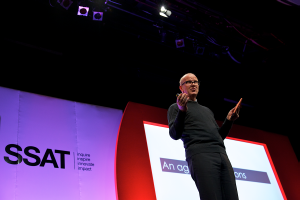 Charles Leadbeater is – amongst many other roles – an advisor to the Department for Education’s Innovation Unit on future strategies for more networked and personalised approaches to learning and education.
Charles Leadbeater is – amongst many other roles – an advisor to the Department for Education’s Innovation Unit on future strategies for more networked and personalised approaches to learning and education.
A leading authority on innovation and creativity, he addressed three key questions to delegates at the SSAT National Conference 2014 that are as salient now as they were then. They are:
- What kind of world will today’s young people face?
- What kinds of organisations and capabilities are best suited to meeting the challenges?
- What would that mean to schools?
What kind of world will today’s young people face?
‘Everything we know about the world that we live in is that it’s subject to huge uncertainty and disruptive change.’ This can only be countered effectively by digital technology ‘and other factors that will allow us to collaborate and organise ourselves in new kinds of ways.
‘So, we’re going to live in an age where the most powerful and influential people might be the small people, rather than the big people.
‘Education, like all regulated industries, may have some protection against that effect, but it won’t be completely immune to it.’
What kinds of organisations are best suited to meeting the challenges?
 Leadbeater believes organisations that will succeed in in this world will be those that are open, so they can continually sense how the world is changing.
Leadbeater believes organisations that will succeed in in this world will be those that are open, so they can continually sense how the world is changing.
‘So, for schools, it means thinking a bit less about how we learn, what we learn, when we learn it, and what the exams are – and a bit more about why we’re doing it and what the purpose is.’
He identified some of the key features that must characterise schooling in the future.
Creativity
School would be a place where young people are taught ‘to find opportunities where there’s no one right answer, where they have to interpret things together, and make things up and improvise, and learn how to muddle through, because not everything can be predicted in advance.’
Entrepreneurialism
He gave the example of Martin Burt, who took over a farm school just outside Asuncion in Paraguay. ‘The kids spend a week on the farm, and then a week in the classroom. This school has 36 profit-making businesses. The money the kids make employs the teachers.’ Students come out with an academic qualification and a business plan.
Self and mutual government
 ‘Absolutely central to a modern experience of education is that young people should also learn what it’s like to teach, or to lead learning. You should come out of school being able to say, “I’ve got these results, these exams, and these are the things I helped other people to learn”.’
‘Absolutely central to a modern experience of education is that young people should also learn what it’s like to teach, or to lead learning. You should come out of school being able to say, “I’ve got these results, these exams, and these are the things I helped other people to learn”.’
He gave an example from Apps for Good, a programme which he chairs: ‘in a terribly small way, we’ve tried to make this central to what we do. We get groups of young people to come up with ideas for mobile phone apps with some sort of social purpose…
We started four years ago in a community centre in South London, with eight students, and this year [2014] we’ve got 20,000.’
Surprisingly, he added, ‘whether they come out with an app or not is pretty much irrelevant. What really matters is that, in the process of testing it, developing it, selling it, articulating it, their self-confidence in their ability to tell you what they’re doing and to persuade you to back it grows enormously.’
What must young people show they can do?
Apply knowledge: countering the idea that the likes of Google and Wikipedia make it unnecessary for people to acquire knowledge, he said: ‘actually, it counts even more because, for example, if you want to know why Russia invaded Crimea, or why your grandparent has got Alzheimer’s, these are things that you need to test, debate, stretch, know how to assemble different kinds of knowledge, reapply and test again.’
Question; know how to pose questions. ‘Most innovation starts not with knowledge, but with really good questions, and an ability to open questions up, to challenge, debate, respond.’
Communicate: ‘not just in written work, but in how you speak. Because this is a world in which you’re going to have to persuade people that what you’re interested in really matters, and to bring them with you.’
Collaborate: ‘you need to learn the skills, the habits and the self-governance to do it.’
Make: school should be a place where you go make things, build things, show things. ‘The amazing thing that we’re finding on Apps for Good is that, without any kind of help from us or teachers, young people are coming to us with fully coded apps that work, which could create businesses.’
Develop grit, determination and persistence, to recover from setbacks. ‘You need to take young people to the edge of where they feel comfortable, and show them that they can go beyond that, with support and help.’
Charles Leadbeater maintained that with all these elements in place, education really would help young people prepare for the world that they will face.
Raising the bar is a key theme of the SSAT National Conference 2015: Quality & Equity and for the very first time secondary SSAT members receive one complimentary delegate place per school.
Charles Leadbeater’s NC14 presentation in full
Follow SSAT on Twitter: @SSAT
Follow Charles on Twitter: @LeadbeaterCh
